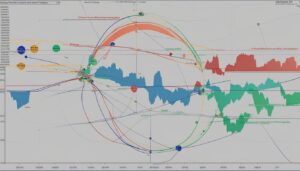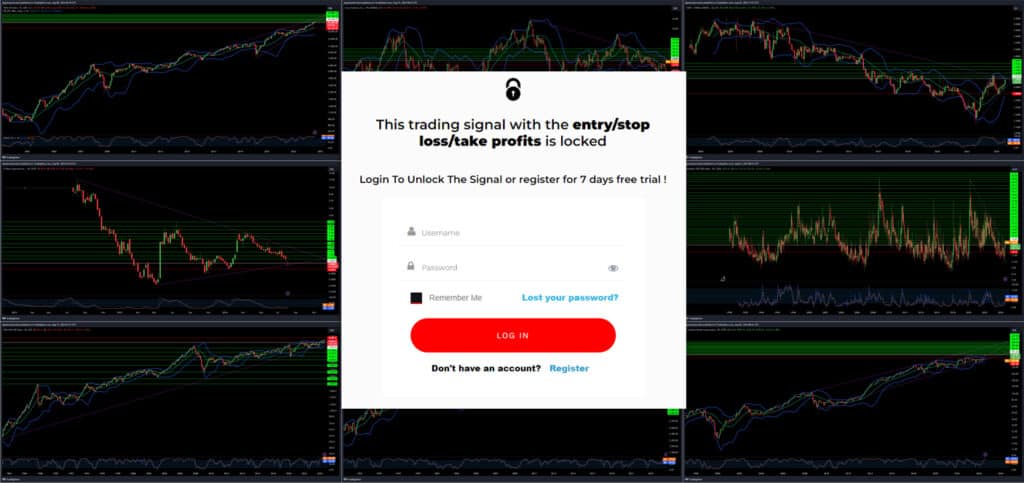Greetings! Today, I want to introduce you to the fascinating world of forex trading and specifically delve into the concept of forex margin. Understanding the basics of forex margin is crucial for those embarking on their trading journey. So, let’s dive in!
Forex, short for foreign exchange, involves the exchange of currencies in the global marketplace. With a daily trading volume of $7.5 trillion, the forex market is the largest and most liquid market in the world. Traders engage in forex trading through spot (cash) and derivatives markets, including forwards, futures, options, and currency swaps.
Forex trading serves various purposes. Traders use it to hedge against currency and interest rate risks, speculate on geopolitical events, and diversify their portfolios. Whether you’re a novice trader or an experienced investor, understanding forex margin is foundational to your success.
Key Takeaways:
- Forex trading involves the exchange of currencies in the global marketplace.
- The forex market is the largest and most liquid market in the world, with a daily trading volume of $7.5 trillion.
- Traders participate in forex trading through spot and derivatives markets.
- Forex margin is used to leverage investments and amplify potential gains.
- Understanding forex margin is essential for both hedging and speculative trading strategies.
What Is the Forex Market and How Does It Work?
The forex market, also known as the foreign exchange market, is where currencies are traded. Unlike other markets, it operates electronically over the counter (OTC) without a central marketplace. The forex market is open 24 hours a day, five and a half days a week, allowing traders to participate from different financial centers worldwide.
Currencies are traded in pairs, such as EUR/USD, with prices determined by various factors, including interest rates, economic performance, and geopolitical sentiment. The forex market consists of two main components: the spot market and derivatives markets.
The spot market is the largest segment of the forex market, where currencies are bought and sold for immediate delivery at the current market price. It enables traders to exchange one currency for another at the prevailing rate. The spot market’s liquidity and tight spreads make it the most popular choice for currency trading.
Derivatives markets in forex allow traders to engage in more complex transactions and manage risk. These markets include forwards, futures, options, and currency swaps. In the derivatives markets, traders can speculate on future currency price movements or enter contracts to hedge against potential losses. These instruments provide flexibility and allow traders to adapt their strategies to market conditions.
“The forex market offers traders the opportunity to participate in currency trading, with the spot market providing immediate exchange of currencies, and derivatives markets offering a wide range of instruments for risk management and speculation.”
Overall, the forex market facilitates currency trading and enables participants to take advantage of fluctuations in exchange rates. Traders can capitalize on their knowledge and analysis of economic trends, interest rate differentials, and geopolitical factors to execute profitable trades.
Types of Forex Markets and How They Work
When it comes to forex trading, there are different types of markets where currencies are bought and sold. Understanding these markets is crucial for anyone looking to trade forex effectively. Let’s take a closer look at the spot market, forwards market, futures market, and options market.
The Spot Market
The spot market is the largest and most popular market in forex trading. In this market, currencies are bought and sold for immediate delivery, meaning transactions are settled “on the spot.” The prices in the spot market are determined by factors such as interest rates, economic performance, and geopolitical sentiment. Traders in the spot market capitalize on short-term price movements to make profits.
The Forwards Market
The forwards market is popular with companies and financial firms looking to hedge their foreign exchange risks. In this market, contracts for future delivery of currencies are bought and sold between two parties over the counter (OTC). The contracts specify the exchange rate, amount, and settlement date. Companies often use the forwards market to secure a future exchange rate and protect themselves against adverse currency movements.
The Futures Market
The futures market, like the forwards market, involves the buying and selling of contracts for future delivery of currencies. However, futures contracts are traded on organized exchanges, such as the Chicago Mercantile Exchange. These standardized contracts specify the amount, delivery date, and quality of the underlying currency. The futures market provides traders with a regulated platform to speculate on currency movements and hedge against potential risks.
The Options Market
The options market deals with contracts that provide the holder with the right, but not the obligation, to buy or sell a currency at a specific price within a predetermined time frame. Options contracts provide traders with flexibility, allowing them to profit from favorable currency movements while limiting potential losses. The options market is popular among traders who want to take advantage of potential currency appreciation or protect their positions against currency depreciation.
These different forex markets provide traders with various options to participate in currency trading. Each market has its own characteristics and advantages, catering to the diverse needs of traders and businesses. Understanding the nuances of each market is essential for developing effective trading strategies and managing foreign exchange risks.
Using the Forex Markets for Hedging and Speculation
When it comes to the forex market, there are two primary strategies that traders and businesses employ: currency hedging and forex speculation. Let’s explore how these strategies work and their significance in forex trading.
Currency Hedging
Currency hedging is a risk management technique used by companies to protect themselves against adverse currency fluctuations. When businesses engage in international trade or have operations in foreign countries, they face the risk of exchange rate movements impacting their profitability. By fixing an exchange rate in advance, businesses can hedge their currency risk and minimize potential losses or maximize gains.
For example, let’s consider a US-based company that exports goods to Europe and expects to receive payment in euros. If the company anticipates that the euro will depreciate against the US dollar, they can use currency hedging techniques to lock in an exchange rate to protect themselves from the potential loss when converting euros back into dollars.
Hedging allows businesses to focus on their core operations without worrying about the impact of currency fluctuations on their bottom line. It provides stability and certainty in an uncertain forex market.
Forex Speculation
Forex speculation, on the other hand, involves taking calculated risks to profit from currency movements. Speculators analyze a variety of factors such as interest rates, economic indicators, political events, and investor sentiment to forecast the future direction of currency prices.
Based on their analysis, speculators take positions in the forex market, either buying (going long) or selling (going short) currency pairs. If a speculator believes a currency will appreciate in value, they will go long on that currency. Conversely, if they anticipate a currency will depreciate, they will go short. The goal is to make a profit from the price difference between the entry and exit points.
Forex speculation is often conducted by individual traders, institutional investors, and hedge funds. It can be a high-risk, high-reward strategy that requires in-depth knowledge, analysis, and discipline. Speculators play a crucial role in providing liquidity and market efficiency.
The Importance of Currency Hedging and Forex Speculation
Currency hedging and forex speculation serve different purposes in the forex market. Hedging helps businesses mitigate risks and protect their profits, while speculation introduces liquidity and the potential for profits based on market analysis.
Both strategies contribute to the overall functioning of the forex market, providing opportunities for risk management and profit generation. Traders and businesses alike can leverage these strategies to achieve their financial goals and navigate the dynamic nature of the forex market.
| Strategy | Purpose |
|---|---|
| Currency Hedging | Minimize risks from exchange rate fluctuations |
| Forex Speculation | Profit from currency movements based on analysis and market forecasts |
Getting Started with Forex Trading
If you’re looking to enter the exciting world of forex trading, there are a few key steps you need to take. First and foremost, it’s crucial to familiarize yourself with the basics of forex and gain a solid understanding of how the market operates.
Once you have a good grasp of the fundamentals, the next step is to set up a brokerage account. A brokerage account is a platform that allows you to execute trades in the forex market. There are numerous brokerage firms to choose from, so take the time to research and select one that suits your needs.
After setting up your brokerage account, it’s time to develop a trading strategy. A trading strategy outlines the rules and techniques you will use to enter and exit trades. It’s important to create a strategy that aligns with your goals, risk tolerance, and trading style.
However, it’s not just about having a solid strategy—emotional equilibrium is equally important. Forex trading can be emotionally challenging, as market fluctuations and unexpected events can trigger fear and greed. Maintaining emotional equilibrium means being disciplined, sticking to your strategy, and avoiding impulsive decisions.
To help you keep track of your trades, it’s a good idea to maintain a trading journal. This journal will allow you to review your trades and identify areas for improvement. By analyzing your past trades, you can learn from your successes and mistakes, and adjust your strategy accordingly.
In summary, getting started with forex trading requires learning the basics, setting up a brokerage account, developing a trading strategy, and maintaining emotional equilibrium throughout your trading journey. With the right knowledge, tools, and mindset, you’ll be well-equipped to navigate the exciting world of forex trading.
Forex Terminology Every Trader Should Know
Familiarizing yourself with forex terminology is essential for successful trading. It’s important to understand key concepts and terms in order to navigate the forex market. In this section, we will cover some important forex terms that every trader should know.
Forex Account
A forex account is a type of brokerage account that allows traders to buy and sell currencies. There are different types of forex accounts available, such as standard accounts, mini accounts, and micro accounts. The account type you choose depends on your trading preferences and the lot size you wish to trade.
Ask Price
The ask price, also known as the offer price, is the price at which you can buy a currency pair in the forex market. It represents the lowest price at which sellers are willing to sell the currency. Traders who want to buy a currency pair will pay the ask price.
Bid Price
The bid price is the price at which you can sell a currency pair in the forex market. It represents the highest price that buyers are willing to pay for the currency. Traders who want to sell a currency pair will receive the bid price.
Contract for Difference (CFD)
A contract for difference (CFD) is a financial instrument that allows traders to speculate on the price movement of an asset, such as a currency pair, without actually owning the underlying asset. When trading forex CFDs, traders enter into an agreement to settle the difference between the opening and closing price of the contract.
Understanding these forex terms will help you navigate the forex market with confidence and make informed trading decisions. It’s important to continue learning and staying updated on the latest forex terminology to enhance your trading skills.
The Advantages of Forex Trading
Forex trading offers several advantages for traders. One of the key advantages is the ability to profit from interest rate differentials between two currencies. When there is a significant difference in interest rates between two countries, traders can earn profits by buying the currency with the higher interest rate and shorting the currency with the lower interest rate. This strategy allows traders to capitalize on the interest rate differential and potentially generate income.
Another advantage of forex trading is the opportunity to take advantage of exchange rate fluctuations. The forex market is known for its volatility, and currency prices can fluctuate rapidly. Traders can profit from these fluctuations by accurately predicting and capitalizing on the movements in exchange rates. By buying a currency at a lower price and selling it when the price increases, traders can generate profits based on these exchange rate fluctuations.
Forex trading provides individuals and institutions with the opportunity to participate in the global currency market. This market is highly liquid and accessible, allowing traders to easily enter and exit positions. With the advancement of technology, trading platforms have become more user-friendly, making it easier for traders to execute their trading strategies.
Conclusion
Understanding the basics of forex margin is crucial for first-time traders venturing into the world of forex trading. By exchanging one currency for another, traders can take advantage of currency movements to generate profits and explore the vast opportunities presented by the global forex market. Operating 24 hours a day, five days a week, this dynamic market offers various trading options, including spot, forwards, futures, and options markets.
For first-time traders, forex trading provides the potential to hedge against currency risks and speculate on currency movements. To begin their forex trading journey, it is essential for traders to gain a deep understanding of the market, set up a brokerage account, develop a robust trading strategy, and maintain emotional equilibrium. Armed with these foundational skills, first-time traders can confidently navigate the forex market and seize profitable opportunities.
Whether trading to mitigate currency risks or to capitalize on currency fluctuations, learning the basics of forex margin is key. By mastering the intricacies of forex trading, first-time traders can set themselves up for success and embark on an exciting journey of financial possibilities.
FAQ
What is forex margin?
Forex margin refers to the amount of money required to open and maintain a trading position. It is a percentage of the total trade size and acts as a deposit or collateral to cover potential losses.
How does the forex market work?
The forex market is a global marketplace where currencies are traded. It operates electronically over the counter (OTC) and lacks a central marketplace. Traders can buy and sell currencies based on factors like interest rates, economic performance, and geopolitical sentiment.
What are the types of forex markets?
The forex market consists of spot, forwards, futures, and options markets. In the spot market, currencies are bought and sold based on their trading price. The forwards market involves contracts traded between two parties over the counter, while futures contracts are traded on exchanges. The options market deals in contracts representing claims to a certain currency at a specific price per unit.
How can forex be used for hedging and speculation?
Forex trading can be used for both hedging and speculation purposes. Companies can hedge their currency risk by fixing an exchange rate in advance, reducing losses or increasing gains based on currency fluctuations. Speculators, on the other hand, take advantage of various factors to profit from currency movements.
How do I get started with forex trading?
To get started with forex trading, you need to learn about the basics of forex and set up a brokerage account. It’s essential to develop a trading strategy, keep track of your positions, and maintain emotional equilibrium. Being disciplined and knowing when to close out positions is also crucial for successful trading.
What forex terminology should I know?
Familiarizing yourself with forex terminology is crucial. Some important terms include forex account, ask price (lowest price to buy a currency), bid price (price to sell a currency), and contract for difference (CFD) (an agreement to settle the difference in asset value between opening and closing of a contract).
What are the advantages of forex trading?
Forex trading offers several advantages, including the ability to profit from interest rate differentials and exchange rate fluctuations. Traders can earn money by taking advantage of differences in interest rates between two currencies or by speculating on currency movements.
Source Links
- https://www.investopedia.com/articles/forex/11/why-trade-forex.asp
- https://www.dailyfx.com/education/beginner
- https://www.schwab.com/learn/story/forex-margin
Disclaimer
All information on this website is of a general nature. The information is not adapted to conditions that are specific to your person or entity. The information provided can not be considered as personal, professional or legal advice or investment advice to the user.
This website and all information is intended for educational purposes only and does not give financial advice. Signal Mastermind Signals is not a service to provide legal and financial advice; any information provided here is only the personal opinion of the author (not advice or financial advice in any sense, and in the sense of any act, ordinance or law of any country) and must not be used for financial activities. Signal Mastermind Signals does not offer, operate or provide financial, brokerage, commercial or investment services and is not a financial advisor. Rather, Signal Mastermind Signals is an educational site and a platform for exchanging Forex information. Whenever information is disclosed, whether express or implied, about profit or revenue, it is not a guarantee. No method or trading system ensures that it will generate a profit, so always remember that trade can lead to a loss. Trading responsibility, whether resulting in profits or losses, is yours and you must agree not to hold Signal Mastermind Signals or other information providers that are responsible in any way whatsoever. The use of the system means that the user accepts Disclaimer and Terms of Use.
Signal Mastermind Signals is not represented as a registered investment consultant or brokerage dealer nor offers to buy or sell any of the financial instruments mentioned in the service offered.
While Signal Mastermind Signals believes that the content provided is accurate, there are no explicit or implied warranties of accuracy. The information provided is believed to be reliable; Signal Mastermind Signals does not guarantee the accuracy or completeness of the information provided. Third parties refer to Signal Mastermind Signals to provide technology and information if a third party fails, and then there is a risk that the information may be delayed or not delivered at all.
All information and comments contained on this website, including but not limited to, opinions, analyzes, news, prices, research, and general, do not constitute investment advice or an invitation to buy or sell any type of instrument. Signal Mastermind Signals assumes no responsibility for any loss or damage that may result, directly or indirectly, from the use or dependence on such information.
All information contained on this web site is a personal opinion or belief of the author. None of these data is a recommendation or financial advice in any sense, also within the meaning of any commercial act or law. Writers, publishers and affiliates of Signal Mastermind Signals are not responsible for your trading in any way.
The information and opinions contained in the site are provided for information only and for educational reasons, should never be considered as direct or indirect advice to open a trading account and / or invest money in Forex trading with any Forex company . Signal Mastermind Signals assumes no responsibility for any decisions taken by the user to create a merchant account with any of the brokers listed on this website. Anyone who decides to set up a trading account or use the services, free of charge or paid, to any of the Broker companies mentioned on this website, bears full responsibility for their actions.
Any institution that offers a service and is listed on this website, including forex brokers, financial companies and other institutions, is present only for informational purposes. All ratings, ratings, banners, reviews, or other information found for any of the above-mentioned institutions are provided in a strictly objective manner and according to the best possible reflection of the materials on the official website of the company.
Forex/CFD trading is potentially high risk and may not be suitable for all investors. The high level of leverage can work both for and against traders. Before each Forex/CFD investment, you should carefully consider your goals, past experience and risk level. The opinions and data contained on this site should not be considered as suggestions or advice for the sale or purchase of currency or other instruments. Past results do not show or guarantee future results.
Neither Signal Mastermind Signals nor its affiliates ensure the accuracy of the content provided on this Site. You explicitly agree that viewing, visiting or using this website is at your own risk.




